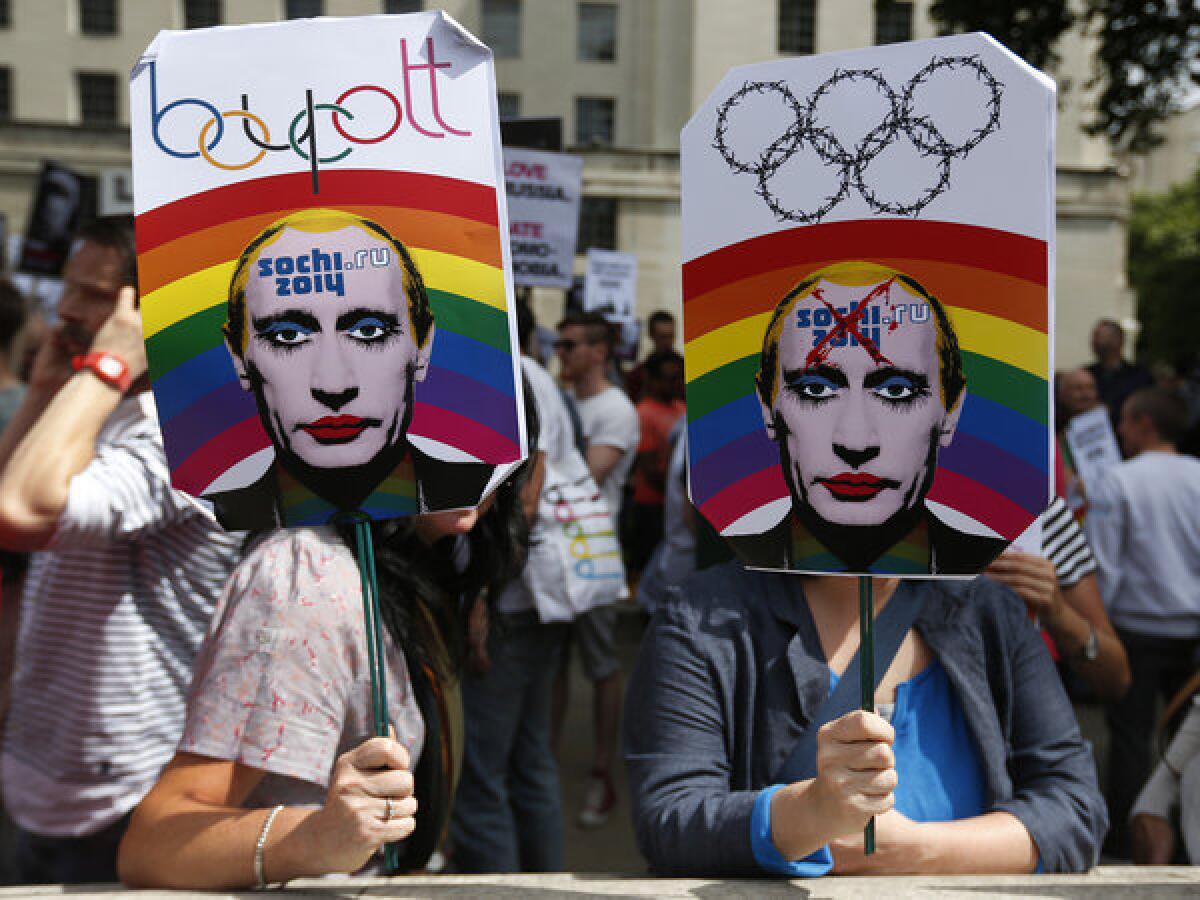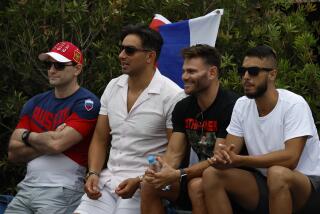West largely rejecting calls for Olympic boycott over Russia anti-gay law

Athletes, sports officials and politicians worldwide have condemned recent Russian legislation that criminalizes public displays of support for gays and lesbians. But an international consensus is building that to boycott the 2014 Olympic Winter Games in Sochi would be counterproductive.
Since President Obama said Friday that he was opposed to the idea of a boycott because of the blow that would deal to athletes who have been training for years to compete, other Western leaders have echoed that sentiment and said they wouldn’t call for their national teams to stay home from the Games in the Russian Black Sea resort.
On Monday, German Foreign Minister Guido Westerwelle, who married his longtime male partner three years ago, joined the chorus of opinionmakers rejecting a Sochi snub to protest the anti-gay legislation adopted in June.
“I consider the discussions on boycotting the Winter Olympic Games in Sochi a mistake,” Westerwelle said, according to Russia’s official Itar-Tass news agency. “This causes more damage to the efforts to protect LGBT [lesbian, gay, bisexual and transgender] rights.”
British Prime Minister David Cameron spoke out over the weekend in opposition to a call for a boycott by British actor Stephen Fry. The actor likened the Russian government’s targeting of gays to Nazi Germany’s repression of Jews that prompted a partial boycott of the 1936 Olympic Games in Berlin.
“I believe we can better challenge prejudice as we attend, rather than boycotting the Winter Olympics,” Cameron said via Twitter.
Fry acknowledged in an interview with the BBC on Saturday that it was probably too late to have the Games moved from Sochi to Vancouver, Canada, the site of the 2010 Winter Olympics. But he urged athletes to display their support for gay rights by crossing their arms over their chest in the opening ceremony and wearing symbols of support for diversity such as the rainbow flag.
Sebastian Coe, who won the first of his four Olympic gold medals in middle-distance running after defying a Western boycott of the 1980 Summer Olympic Games in Moscow, was back in the Russian capital over the weekend for the world athletics championships. He told reporters he remains opposed to subjecting sports competitions to political boycotts.
“I don’t think they achieve what they set out to do. They harm only one group: the athletes,” said Coe, now head of the British Olympic Assn.
Canadian Foreign Minister John Baird also has been critical of the Russian law that bans discussing gay rights around children or making public displays in support of homosexuality, as in gay pride events. But he too has come out against boycotting Sochi.
“We want to see the athletes succeed,” Baird told reporters accompanying him on a trip to Latin America, according to the Canada.com website. “We’ve got an important opportunity for the free world to put the focus on what’s happened in Russia in the recent weeks and months, and hopefully that can be able to change.”
While the leaders of major countries are seemingly agreed on the idea that attending the Sochi Olympics will give them a chance to speak out against the anti-gay law, those calling for a boycott continue to press for the gesture of censure against host Russia.
Rusa LGBT and its affiliated gay rights advocacy group Queer Nation on Monday rejected an International Olympic Committee claim to have “assurances” from Moscow that there would be no repression of gays during the Games, now less than six months away.
“Activists advocating boycotts of Russian products and the 2014 Winter Olympic Games in Sochi are demanding that the International Olympic Committee seek a repeal of Russia’s anti-gay law – rather than a two-week suspension of the law during the Games,” Queer Nation spokesman Duncan Osborne said in a statement.
Among those pushing for a boycott of Sochi is Masha Gessen, a prominent author and lesbian activist who said the law has forced her to flee Russia with her partner and their three children.
“Suspending these laws in Sochi for two weeks won’t help ordinary gay men and lesbians in the rest of Russia once the Olympics leaves town,” said Gessen, who wrote the critical biography of Russian President Vladimir Putin titled “The Man Without a Face.”
“The IOC is saying, in essence, that it is willing to work with a fascist government as long as international visitors are protected,” Gessen said. “This is a profoundly immoral position.”
IOC President Jacques Rogge said this month that Russian Sports Minister Vitaly Mutko had provided assurances that the law banning “propaganda of nontraditional sexual relations” wouldn’t be applied to visitors attending the Feb. 7-23 winter games in Sochi.
Rogge said Friday, however, that he had asked for “clarifications” before passing final judgment on whether those assurances are sufficient for Russia to uphold the conditions and practices contractually demanded of Olympic host nations.
ALSO:
Britain threatens legal action over Gibraltar
President Mugabe of Zimbabwe tells defeated rivals: “Go hang”
Slain businessman Neil Heywood’s family seeks damages in China murder case
A foreign correspondent for 25 years, Carol J. Williams traveled to and reported from more than 80 countries in Europe, Asia, the Middle East and Latin America.
More to Read
Start your day right
Sign up for Essential California for news, features and recommendations from the L.A. Times and beyond in your inbox six days a week.
You may occasionally receive promotional content from the Los Angeles Times.







